The communal divide in Karnataka is only increasing. After the hijab controversy rocked the state with pro and anti hijab protests, followed by the Muslim religious leaders calling for a state-wide bandh on March 17 to protest the High Court judgement that upheld the hijab ban inside the classrooms, the recent ban on Muslim vendors at Hindu temple fairs and festivals is widening the rift between the two communities, especially in coastal Karnataka and Malnad regions.
The first temple to ban Muslims from setting up the stalls was Hosa Marigudi temple in Kaup in Udupi district, which did not allow Muslims to bid for the shops during the 'Suggi Mari puje', an annual fair. The temple managing committee also barred sub contracting of the shops to non-Hindus.
“The local devotees were outraged when Muslims shut their shops on March 17, to support the bandh to protest the hijab case verdict. We welcome the temple committee decision,” said Prakash Kukkehalli, an office-bearer of Hindu Jagaran Vedike, Mangaluru.
After the Kaup incident, similar bans were imposed in Mahalingeshwara temple in Puttur and Bappanadu Sri Durgaparameshwari temple in Dakshina Kannada, and Hindu activists have been appealing to major temples in Hassan (Chenna Keshava temple in Belur), Chikkamagaluru (Sringeri temple), Tumakuru, Shivamogga and Bengaluru not to allow Muslim traders to transact business during Hindu temple fairs.
Leader of the opposition Siddaramaiah alleged that BJP was indulging in polarisation politics. “Every citizen has a fundamental right to conduct business. BJP is practising hate politics,” he alleged.
Pointing out the irony, MLC C.M. Ibrahim raised the issue in the upper house on Friday and said the Muslim vendors were being prevented from setting up stalls in Bappanadu temple, which was built by a Muslim.
Even as the Congress leaders raised the issue of temple committees denying allotment of shops to Muslim vendors in the state assembly, Law minister J.C Madhuswamy pointed out that the ban existed since 2002 and was not a new rule imposed by the BJP government. “The rules under the Karnataka Hindu Religious Institutions and Charitable Endowments Act of 2002 were passed during the Congress government headed S.M. Krishna,” said Madhuswamy.
The rules barred non-Hindus from doing business in the vicinity of Hindu temples under the Muzrai (endowment) department. The rule states that “no property including land, building or sites situated near the institution shall be leased out to non-Hindus”.
Meanwhile, the Hindu outfits have put up banners outside temples, stating that they would not allow people who disrespect the Indian judiciary and the Constitution, kill and consume cows worshiped by Hindus and threaten the integrity of India, to run their businesses outside the temples.
The state capital too saw some Hindu activists force Muslim shopkeepers to shut down their footwear stalls near Sri Anjaneya Temple in Bengaluru’s Kempegowda circle (Majestic area). “The Muslims have set up footwear shops in the vicinity and near the entrance to the temple. You normally expect flowers and fruits to be sold outside temples. But this has hurt our sentiments, and renting out the shops to Muslims is also a violation of the government rule,” said a Hindu activist.
Pramod Mutalik, chief of Sri Ram Sene, called for economic boycott of Muslims, stating it was the only “effective tool” to change the “separatist” mindset of the Muslim community. “Islamisation of India is happening, the Muslims are rejecting our judiciary, they block cities for months, protesting against CAA/NRC. They called for boycotting Patanjali products during the anti-CAA protests. Last October, Muslims had boycotted fish purchases from fisherwomen at Gangolli fishing port, upset over the fisherfolk taking part in a anti-cow slaughter protest march,” reasoned Mutalik.
Wakf board chairman Moulana Shafi Saadi contended that the Hijab verdict was unacceptable to the 24 crore Muslims in the country and hence the community decided to appeal before the Supreme Court. “A few Muslims objected to Hindus wearing “bindi” and bangles to educational institutions. I think it was not correct. But the current ban on Muslim vendors on Temple premises is not right. Why should you punish the entire community for the folly of a few people,” asked Saadi.





